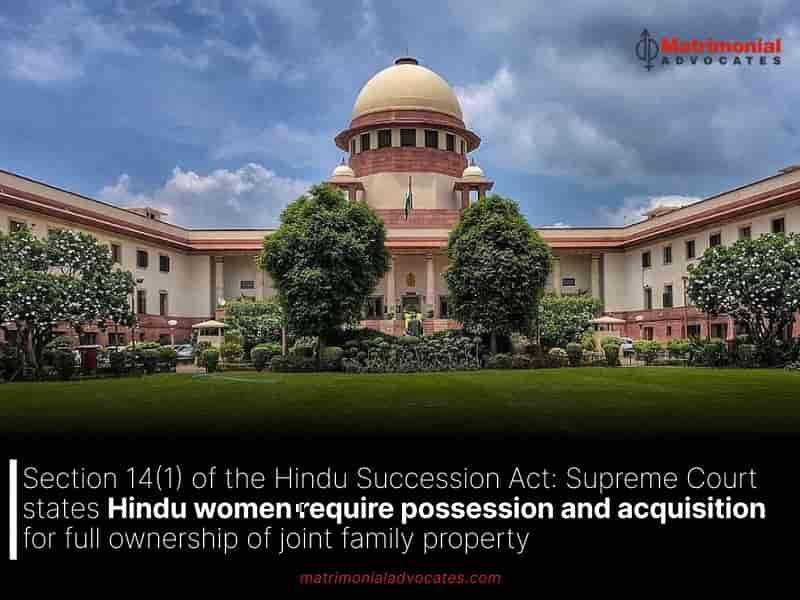
“Such acquisition must be either by way of inheritance or devise, or at a partition or in lieu of maintenance or arrears of maintenance or by gift or by her own skill or exertion, or by purchase or by prescription.”
Supreme Court Ruling: In a case involving a widow’s right to maintenance from Hindu family property, the Supreme Court overturned previous decisions by the Rajasthan High Court’s Division Bench and a Single Judge. Justices BR Gavai and Sandeep Mehta clarified that for a Hindu woman to fully own undivided joint family property under Section 14(1) of the Hindu Succession Act, she must possess and acquire it.
Background: The property in question was owned by a man named A, who had two sons, M1 and M2. M2 was married to the widow who filed the case. After her husband’s death, the widow claimed to have adopted a son on 12-06-1959, almost 30 years later. M1’s son made a will leaving the entire estate to his son (the current appellant). M1’s son died in 1954, and the property was passed to the appellant according to the will. The widow filed a suit to declare her ownership and gain possession of the property, arguing it was joint family property and the will was invalid. The Civil Court dismissed her suit on 21-05-1959 but acknowledged her right to maintenance from the property. The appellant challenged this, and the Senior Civil Judge overturned the Civil Court’s decision on 09-02-1968.
The widow then appealed to a Single Judge of the High Court. After her death, her adopted son continued the appeal. The Single Judge restored the Civil Court’s decision about her maintenance rights. The adopted son later filed a Revenue Suit for partition of the property, claiming his mother was entitled to a share under Section 14(1) of the Hindu Succession Act. The Division Bench’s judgment from 02-11-2017 was the subject of the present appeal.
Court’s Analysis and Decision: The Court observed that the widow’s claim to title and possession of the property had been denied earlier, and she was never in possession of it. She did not challenge the 21-05-1959 judgment that granted her only maintenance rights. The Court cited Munni Devi v. Rajendra, 2022 SCC OnLine SC 643, where a widow living in the property and collecting rent was deemed to have acquired the property in place of her right to maintenance, thus owning it fully under Section 14(1) of the Hindu Succession Act.
Regarding the question that whether in absence of even a semblance of possession either actual or legal over the suit property, plaintiff-son being the legal heir of widow-wife was entitled to institute a Revenue suit for partition of the suit property based on the succession rights of the widow on the joint Hindu family property, the Court referred to Ram Vishal v. Jagan Nath, (2004) 9 SCC 302, wherein, it was held that, a pre-existing right is a sine qua non for conferment of a full ownership under Section 14 of the Hindu Succession Act. The Hindu female must not only be possessed of the property but she must have acquired the property. Hence, the Court reiterated that, for establishing full ownership on the undivided joint family estate under Section 14(1) of the Succession Act, the Hindu female must not only be possessed of the property but she must have acquired the property and such acquisition must be either by way of inheritance or devise, or at a partition or “in lieu of maintenance or arrears of maintenance” or by gift or be her own skill or exertion, or by purchase or by prescription. Thus, the Court held that since, the widow-wife was never in possession of the suit property, as a necessary corollary the Revenue suit for partition claiming absolute ownership under Section 14(1) of the Succession Act could not be maintained by her plaintiff-son by virtue of inheritance.





